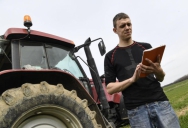
Young farmers are key in the future Common Agriculture Policy, say S&Ds
Date
Tue, 05/29/2018
Sections
Agriculture & Food
Young farmers represent a great potential for the agriculture sector, as they are keener to innovate and diversify. Hence, the new Common Agriculture Policy must embody a strong and concrete policy to support their development across Europe. In the EU, only 6% of farmers are under 35 years old, whilst more than half of the total is already over 55. We desperately need a generation turnover.
Following the vote today on the report on the implementation of CAP young farmers’ tools in the EU after the 2013 reform, the S&D rapporteur, Nicola Caputo, stated:
“The so-called ‘access to the land’ and ‘access to the capital’ turned out to be some of the biggest barriers to the young farmers willing to start their business in the agriculture sector in the EU.
“To make this possible, in the context of the new CAP after 2020, the S&D Group proposed some important tools that could revolutionize the sector.
“First and foremost, in the next EU budget, the programme in favour of young farmers must be confirmed and the maximum level of funding be increased beyond 2%. The Direct Payment structure should also be re-evaluated, as the current one requires only minimal active use of the land, allocating subsidies mainly because of land ownership. This incentivizes the existing farmers to retain land access in order to retain subsidy access. This system does not imply the best use of the land. We recommend increasing the activity levels required to receive payments, and targeting subsidy payments towards achievement of particular outcomes.
“An additional tool such as the Land Banks could facilitate the access to the land for the young farmers. Dealing with this problem also requires the creation of incentives for older farmers to pass their farms on to younger generations.
“Member states also have a big role to play in order to facilitate generational renewal through, for example, inheritance and taxation laws, rules on access to land, territorial planning and farm succession strategies.
“We also believe that the administrative burden should be heavily reduced to give EU farmers more flexibility to respond to changing conditions on the markets with their business plans.
“Last but not least, we should promote much more innovation and digitisation in the agriculture sector in order to attract young farmers who can make the best use of technological advancements.
“If at the European level, we will be able to put into practice all these tools, the agriculture sector could go through a huge boost that means new employment, innovative and safer food technologies and keep rural areas attractive and alive.”

